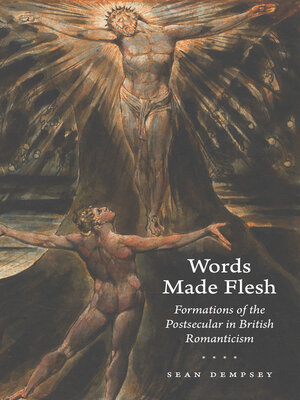Words Made Flesh
ebook ∣ Formations of the Postsecular in British Romanticism · Studies in Religion and Culture
By Sean Dempsey

Sign up to save your library
With an OverDrive account, you can save your favorite libraries for at-a-glance information about availability. Find out more about OverDrive accounts.
Find this title in Libby, the library reading app by OverDrive.



Search for a digital library with this title
Title found at these libraries:
| Library Name | Distance |
|---|---|
| Loading... |
Religion is not merely a different way of thinking but is rather an alternative manner of being—it is both a way of attending to the world and a form of embodiment. Literature provides another key to legislating new ways of being in the world. Some of the best Romantic literature can be understood as experimental attempts to access and harness infrasensible energy—affects and dispositions operating beneath the threshold of consciousness—in the hope that by so doing it may become possible to project elusive affects into the practical world of conscious thinking and judgment. Words Made Flesh demonstrates how the Romantic poets Samuel Taylor Coleridge, John Keats, and Percy Bysshe Shelley and the novelist Jane Austen affect, mediate, and ultimately alter our very sense of embodiment in ways that have lasting effects on readers' affective, political, and spiritual lives. Such works, which unsettle habitual ways of seeing, are perennially valuable because they not only call attention to the dispositions we normally inhabit, but they also suggest ways of forging new patterns and forms of life through the medium of embodiment.
Drawing on the work of these writers, Dempsey argues that Romanticism's contribution to our understanding of the postsecular becomes clearer when considered in relation to three timely scholarly conversations not previously synthesized: secular and postsecular studies, affect theory, and media studies. By weaving together these three strands, Words Made Flesh clarifies how Romanticism provides a useful field guide to the new geography of the self ushered in by secular modernity, while also pointing toward potential postsecular futures. Ultimately, Dempsey argues for a view of literature that recognizes it as an essential component to ethical practice.







